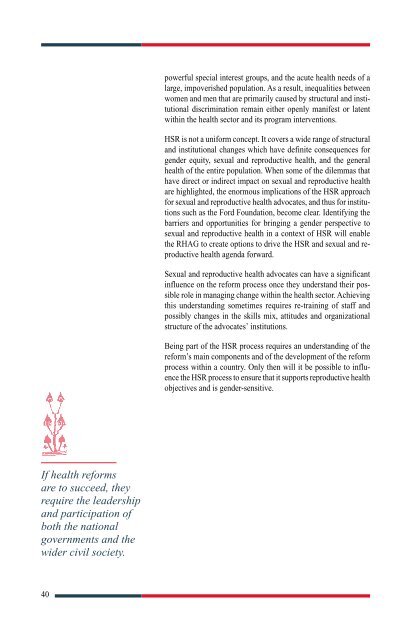Globalization, Health Sector Reform, Gender and ... - Ford Foundation
Globalization, Health Sector Reform, Gender and ... - Ford Foundation
Globalization, Health Sector Reform, Gender and ... - Ford Foundation
- No tags were found...
You also want an ePaper? Increase the reach of your titles
YUMPU automatically turns print PDFs into web optimized ePapers that Google loves.
powerful special interest groups, <strong>and</strong> the acute health needs of alarge, impoverished population. As a result, inequalities betweenwomen <strong>and</strong> men that are primarily caused by structural <strong>and</strong> institutionaldiscrimination remain either openly manifest or latentwithin the health sector <strong>and</strong> its program interventions.HSR is not a uniform concept. It covers a wide range of structural<strong>and</strong> institutional changes which have definite consequences forgender equity, sexual <strong>and</strong> reproductive health, <strong>and</strong> the generalhealth of the entire population. When some of the dilemmas thathave direct or indirect impact on sexual <strong>and</strong> reproductive healthare highlighted, the enormous implications of the HSR approachfor sexual <strong>and</strong> reproductive health advocates, <strong>and</strong> thus for institutionssuch as the <strong>Ford</strong> <strong>Foundation</strong>, become clear. Identifying thebarriers <strong>and</strong> opportunities for bringing a gender perspective tosexual <strong>and</strong> reproductive health in a context of HSR will enablethe RHAG to create options to drive the HSR <strong>and</strong> sexual <strong>and</strong> reproductivehealth agenda forward.Sexual <strong>and</strong> reproductive health advocates can have a significantinfluence on the reform process once they underst<strong>and</strong> their possiblerole in managing change within the health sector. Achievingthis underst<strong>and</strong>ing sometimes requires re-training of staff <strong>and</strong>possibly changes in the skills mix, attitudes <strong>and</strong> organizationalstructure of the advocates’ institutions.Being part of the HSR process requires an underst<strong>and</strong>ing of thereform’s main components <strong>and</strong> of the development of the reformprocess within a country. Only then will it be possible to influencethe HSR process to ensure that it supports reproductive healthobjectives <strong>and</strong> is gender-sensitive.If health reformsare to succeed, theyrequire the leadership<strong>and</strong> participation ofboth the nationalgovernments <strong>and</strong> thewider civil society.40
















